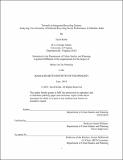Towards an integrated recycling system : analyzing two scenarios of informal recycling sector performance in Mumbai, India
Author(s)
Kohn, Jacob(Jacob Elias)
Download1140507644-MIT.pdf (21.59Mb)
Alternative title
Analyzing two scenarios of informal recycling sector performance in Mumbai, India
Other Contributors
Massachusetts Institute of Technology. Department of Urban Studies and Planning.
Advisor
Sarah Williams.
Terms of use
Metadata
Show full item recordAbstract
Waste management in the Global South is often performed through informal means, causing differences in service provision. Many cities around the world are experimenting with ways to address these dynamics by developing formal systems known as Material Recovery Facilities (MRFs). Scholars and practitioners are positive about the potential of these decentralized recycling processing facilities for improving the sorting of recyclable materials in urban areas. However, the effects of particular arrangements of these facilities on informal-sector recyclers are less well known. In Mumbai, India, the municipal government has proposed introducing MRFs in each ward of the city, and hopes to integrate informal recyclers into the MRF system. I focus on the effect of these MRFs on kabadiwalas, small-scale aggregators in the informal sector. Using economic and geospatial data for three wards of the city, I compare the proposed decentralized MRF system with the current hierarchical system of informal recycling to understand the economic benefits to the kabadiwala within each system. Specifically, how would the new system change the profit margins for kabadiwalas, distances traveled by collectors at each level, and material flow rates? I find ward-wise variations in collectors' travel times, distances covered, and weekly economic profits, underlining the role of the geographic placement of an MRF on its ability to compete with current systems and positively affect kabadiwala livelihoods. This comparison helps shed light on an essential but poorly understood sector of urban infrastructure. It explores whether this formalization effort truly benefits informal workers, and reveals potential differences in policy implementation at a more granular level.
Description
This electronic version was submitted by the student author. The certified thesis is available in the Institute Archives and Special Collections. Thesis: M.C.P., Massachusetts Institute of Technology, Department of Urban Studies and Planning, 2019 Cataloged from student-submitted PDF version of thesis. Includes bibliographical references (pages 120-129).
Date issued
2019Department
Massachusetts Institute of Technology. Department of Urban Studies and PlanningPublisher
Massachusetts Institute of Technology
Keywords
Urban Studies and Planning.